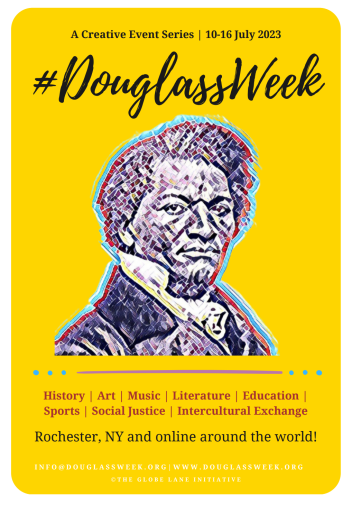It is Rochester’s turn to play host to the third annual #DouglassWeek. The event, which begins today, honors the legacy and inspiration of Frederick Douglass.
More than 40 in-person and virtual talks, performances and events will celebrate Douglass’ life and his achievements, the Douglass family and current changemakers. The event runs July 10-16.
Caroline Dunham-Schroeter and Kristin M. Leary are co-organizers of #Douglass Week. The Frederick Douglass Family Initiatives, a nonprofit organization founded by Douglass descendants, is a partner.

“We are delighted to be able to commemorate the life of Frederick Douglass and his efforts to abolish slavery and change the future for generations to come,” says Dunham-Schroeter. “We believe it’s vital to bring these stories to the locations where he had an impact during his lifetime and explore what the Douglass family stories mean to contemporary issues of identity, race, independence and equal rights around the world.
The weeklong event is organized by the Globe Lane Initiative, which gets its name from the venue where Douglass first spoke in Cork, Ireland, in 1845. The nonprofit works with Douglass scholars, historians, researchers, artists, community activists and others worldwide.
Ireland has a deep connection to Douglass. A speaking tour through Ireland and Britain, he raised funds for the abolitionist cause in the United States. Douglass called his time in Ireland “transformative.” Douglass left for Ireland after he escaped enslavement seven years earlier, at age 20.
Scholars often point to the words Douglass wrote while in Ireland: “One of the most pleasing features of my visit, thus far, has been a total absence of all manifestations of prejudice against me, on account of my colour. The change of circumstances in this is particularly striking. … I find myself not treated as a color, but as a man—not as a thing.”
The Cork Abolitionists Trail, a walking trail of sites where Douglass lived and spoke during his time in the city, commemorates his journey and is part of the Globe Lane Initiative’s Journeys for Freedom project. #DouglassWeek 2023 will also highlight the Sister City relationship between Rochester and Waterford, organizers say.
The inaugural #DouglassWeek occurred in Ireland two years ago. Last year, Washington, D.C., was the venue. Rochester has a fitting role as host—Douglass lived here for 25 of his most active years. He published the North Star newspaper here and is buried at Mt. Hope Cemetery.
#DouglassWeek participants respond to the story of Douglass and other changemakers through historical, creative, academic, cultural and other lenses to describe the influence of history on contemporary topics and conversations, organizers say.
“By remembering and honoring our history and the Douglass legacy,” says Leary, “we hope to influence and inspire transformative change today.”
Rochester in-person activities include a 5K walk/run, a family-friendly community event, a commemoration at Douglass’ gravesite and a photography walk.
Here are some highlights of the #DouglassWeek:
50th anniversary of the Frederick Douglass Papers: An online discussion moderated by Ezra Greenspan of Southern Methodist University that includes insight into the project’s early years and current work on new print and digital editions. (July 10)
Underground railroad story hour: A Douglass-themed story hour at Rochester Museum and Science Center. Attendees will read “Frederick’s Journey” by Doreen Rappaport and explore other speeches and writings from members of the Douglass family. (July 11)
Freedom to Flight exhibit: A guided tour at RMSC of the Douglass’ South Avenue home with an exploration of documents, heirlooms and artifacts. (July 11)
The lost history of Frederick Douglass and the University of Rochester: A lunch hour presentation on connections, associations and friendships between Douglass and members of the university administration, faculty and student body. (July 12)
Ink on the page: Making our mark in predominantly white spaces: A conversation led by Micah Williams, Tashjaé Scales, Yash Chitrakar, and Nashae Prout, four UR doctoral students. The discussion will expand upon the ways students of color survive/thrive/provide/reside/deny the spaces that historically have intended to erase their narratives from the world. (July 13)
Douglass Dialogues: The Douglass grandchildren: Kenneth Morris Jr., great-great-great grandson of Frederick and Anna Douglass, and Celeste-Marie Bernier, professor at the University of Edinburgh, hold a virtual conversation providing response and contemplation about facts and stories revealed through Bernier’s extensive research into the lives of the Douglass grandchildren. (July 14)
Family-friendly gathering: The Frederick Douglass Community Library in Rochester will host three hours of activities that include storytelling, reenactments, an art installation, activity stations and opportunities to meet members of the Douglass family. (July 15)
Harmonies of Freedom: Honoring the Douglass family legacy through music: An evening of performances and readings by local musicians, dancers and others at the Hochstein School of Music. (July 15)
Remembrance and reflection at Douglass family gravesite: Members of the Douglass family, local singers, and dignitaries will gather the Douglass family gravesite for remarks, readings, and song as an uplifting close to #DouglassWeek. (July 16)
For scheduled times and other events click here.
Smriti Jacob is Rochester Beacon managing editor. The Beacon welcomes comments and letters from readers who adhere to our comment policy including use of their full, real name. Submissions to the Letters page should be sent to [email protected].
Correction. Only part of the Douglass family will be celebrated. As usual, Douglass’ second wife, Helen Pitts Douglass from Honeoye will be ignored, despite the fact that she was responsible for saving Frederick’s home and papers at Cedar Hill in the District of Columbia, and for the creation of the Frederick Douglass Memorial and Historical Association which protected and preserved Douglass’ physical legacy until it was taken over by the National Park Service and the National Archives in the 1960s. All this was accomplished with no assistance, and in fact with opposition, from Douglass’ children. Indeed, following Douglass’ death in 1895, Helen was forced to scrounge for funds to buy the children’s shares in Cedar Hill to prevent it being lost to the nation.